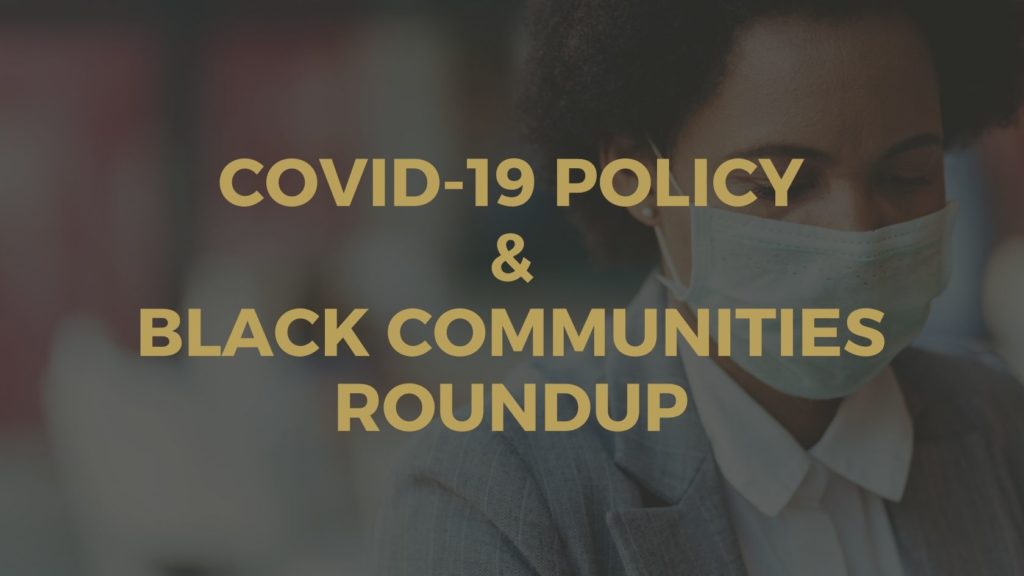
June 29 COVID-19 Policy & Black Communities Roundup
Upcoming Economic Data May Affect Next Coronavirus Stimulus
On Thursday, July 2 the Bureau of Labor Statistics will release the June employment situation report, which will illuminate the status of the labor market (including data on unemployment among Black communities). On the same day, the Department of Labor will release last week’s initial unemployment claims data and the Congressional Budget Office will release An Update to the Economic Outlook: 2020 to 2030. These releases will provide significant data on the state of the economy and will likely affect arguments about additional stimulus legislation. Bloomberg reports that high Black unemployment may prompt members of Congress to keep extra unemployment benefits in place beyond July’s deadline. The Senate is expected to negotiate the upcoming stimulus in late July.
Health Care Battle Re-emerges
On the heels of House Democrats introducing legislation to expand the Affordable Care Act (ACA), the Trump administration appealed to the Supreme Court to invalidate ACA. Repeal of the ACA would put access to health insurance at risk for more than 20 million people during the coronavirus pandemic, and would increase the percentage of non-elderly African Americans who are uninsured from 11% to 20%. The Center on Budget and Policy Priorities (CBPP) says repeal would “also widen racial gaps, with Black and Hispanic people disproportionately likely to lose health coverage…” CBPP points out that during the Great Recession from 2007 to 2010 (prior to the ACA), “the uninsured rate rose by 24 percent for Black people, compared to 9 percent for white people.”
Congressional Coronavirus Oversight Commission Finally Eyes a Chairperson
Last week, retired General Joseph Dunford emerged as the leading candidate for Speaker Nancy Pelosi and Senate Majority Leader Mitch McConnell to chair the five-member Coronavirus Oversight Commission. Created by the CARES Act to provide transparency and oversight of coronavirus relief funds, the commission has gone without a leader for three months and—should Dunford be selected—would still have no African American members. A separate U.S. House coronavirus oversight panel is chaired by House Majority Whip James Clyburn (D-SC) and includes Congresswoman Maxine Waters (D-CA).
More Transparency for Small Business Relief Programs
Last week, Treasury Secretary Steven Mnuchin agreed to provide relevant congressional committees with full access to loan data from the Paycheck Protection Program (PPP), not just for loans of $150,000 or more (as Mnuchin had earlier agreed). This action was in response to demands from U.S. House Coronavirus Select Committee Chair and Majority Whip James E. Clyburn and other Members of Congress from both parties.
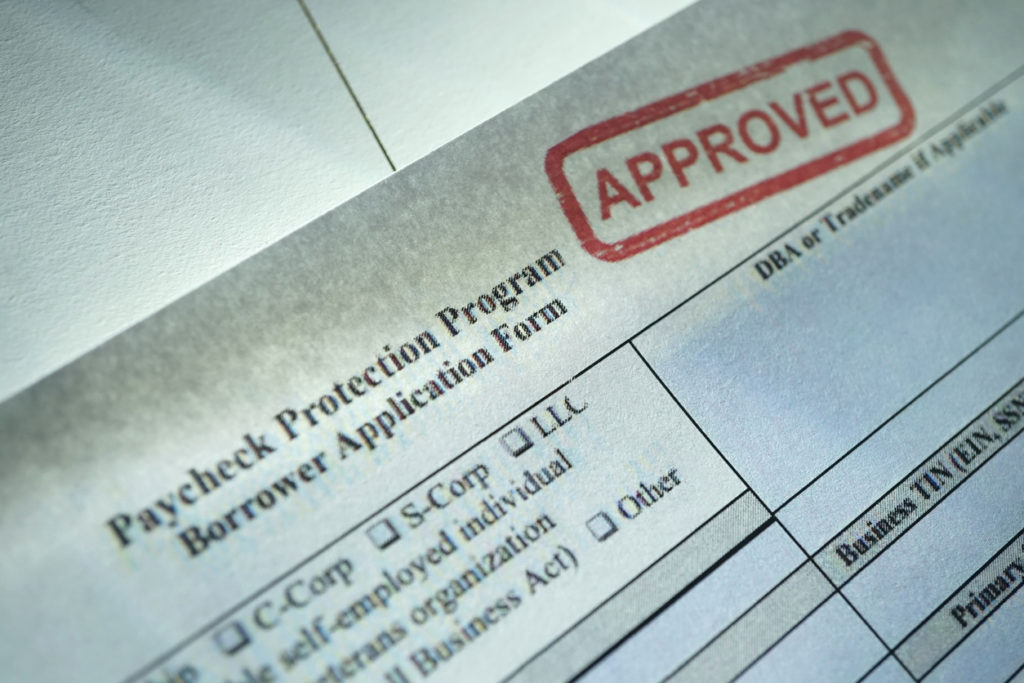
The General Accountability Office (GAO) called on the Trump administration to increase efforts to police the distribution of PPP funds after finding significant risk of fraud and resistance at the U.S. Small Business Administration, the agency running the program. The GAO also issued a report announcing the IRS sent $1.4 billion coronavirus relief payments to more than 1 million dead Americans. On Thursday, June 26, the Washington Post reported on a rule issued by the Trump Administration that “allows lawmakers, Small Business Administration staff, other federal officials and their families to bypass long-standing rules on conflicts of interest to seek [PPP] funds for themselves.”
Of the total $660 billion allocated as Paycheck Protection Program Funds, as of June 26 $518 billion in loans had been distributed and the average loan size was $108,639.
On Tuesday, June 30 the House Committee on Financial Services–under the leadership of Chairwoman Maxine Waters (D-CA)–will hear from Treasury Secretary Steven Mnuchin and Federal Reserve Chair Jerome Powell on COVID-19 response efforts by the Treasury Department and Federal Reserve. The House Committee on Small Business will hold a hearing on the Economic Injury Disaster Loan Program.
Other Key Black Federal Policy Issues

Police reform legislation is deadlocked. Last week House Democrats passed sweeping police reform legislation (the George Floyd Justice in Policing Act), but Senate Majority Leader Mitch McConnell (R-KY) indicated the Senate will not take up the bill. A GOP police reform proposal led by Senator Tim Scott (R-SC) and opposed by the NAACP, the Leadership Conference, and other civil rights organizations was blocked by Senate Democrats. Democrats—including Senators Kamala Harris (D-CA) and Cory Booker (D-NJ)—explain that the GOP proposal does not hold law enforcement accountable in court for misconduct, lacks adequate misconduct disclosure provisions, lacks sufficient provisions banning racial profiling and chokeholds, and lacks a national use of force standard (the New York Times illustrates key differences between the Democratic and Republican bills). CNN reports that “[a]fter weeks of protests, meaningful police reform appears unlikely.”
Joint Center President Spencer Overton testified before Congress last week on online disinformation, voter suppression, and Section 230 of the Communications Decency Act. Spencer explained that even in the aftermath of the killing of George Floyd, there exists a real question about whether social media companies will address their own systemic shortcomings and fully embrace civil rights principles.
In response to protesters who are toppling Confederate and other monuments, President Trump signed an executive order maximizing prosecution of those who remove or vandalize the monuments and withholding federal support from state and local law enforcement that fail to protect the monuments.
For more on Congress and the COVID-19 stimulus this week, see the National Urban League’s Washington Bureau Insider.
Reduced Polling Sites in Kentucky Give Black Voters Reason for Concern
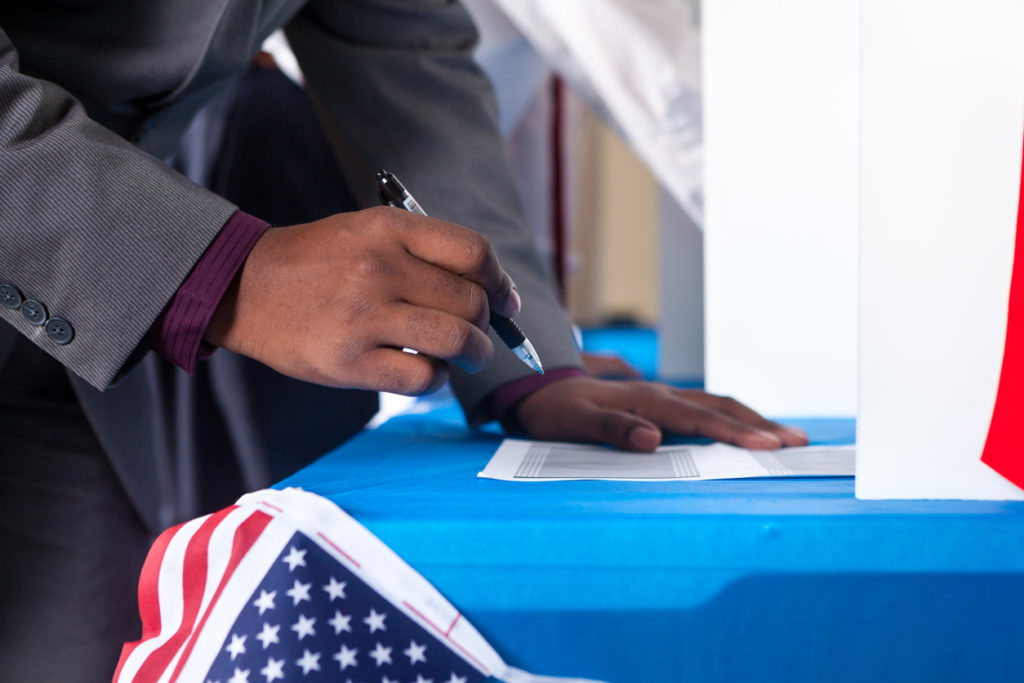
Black voter suppression concerns for the November election were heightened when the state of Kentucky reduced the number of polling sites for last week’s primary elections to just one for the predominantly Black county of Jefferson. The county includes Louisville and houses more than 767,000 residents.
Activists LeBron James, Stacey Abrams, and many others expressed concerns and voters reportedly were banging on the door at 6 pm at the Louisville polling site. (See CNN, Newsweek, and Forbes.)
However, the Washington Post Editorial Board concluded that “a traffic jam at the entrance delayed several dozen voters, and a judge had to order the polling place to remain open for them to vote. But the rest of the day ran smoothly.” Overall, the state drastically reduced polling sites from 3700 to 200 reportedly due to a shortage of poll workers.
Economic Studies & COVID-19
Although all states have begun to re-open, 1.48 million unemployment claims and more than 728,000 Pandemic Unemployment Assistance claims were filed the week ending June 20. Prior to the coronavirus pandemic, the highest single-week high for traditional unemployment insurance benefits was 695,000 claims in 1982.
A paper prepared for a Brookings conference stated that Black workers were among the group who “were more likely to lose their jobs in April and, having done so, less likely to start work again in May.” The research also showed that Black workers were 4.6 percentage points more likely to exit work in April relative to white workers.
Joint Center Vice President Jessica Fulton was quoted in the New York Times emphasizing the importance of looking beyond unemployment rates when thinking about how the current economic crisis may affect Black children. When discussing how rising unemployment rates might understate the economic situation for Black parents, Jessica stated “If you’re a single mom, for example, and you are not looking for a job because your kids are at home, you don’t get counted.”
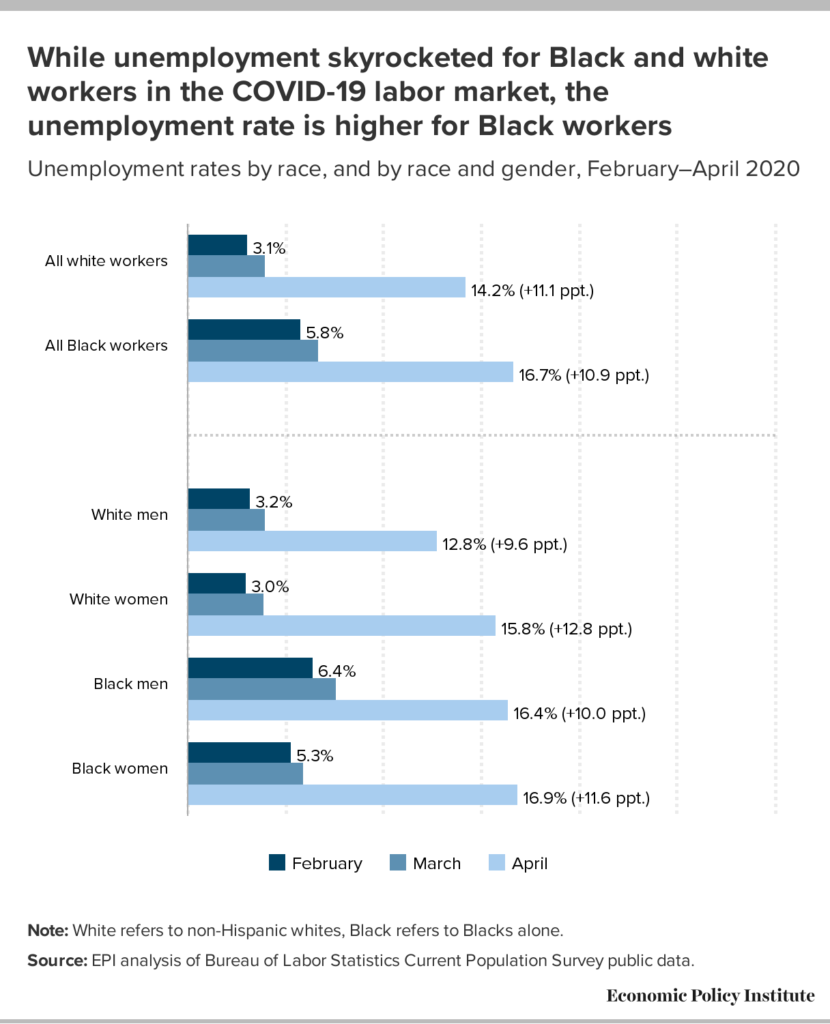
In a blog post for the Economic Policy Institute, Anna Gifty Opoku-Agyeman argued for the importance of centering Black women in recovery efforts, and emphasized data that show that employment for Black women dropped from 58.4% in February to 47.4% in April. Comparatively, employment for all Black workers was 59.4% in February and dropped to 48.8% in April, down 10.6 percentage points.
Affordability and previous failures with regulations continue to prevent communities of color from accessing broadband, according to Reveal. The National Digital Inclusion Alliance makes the case that the existing broadband focus on “unserved and underserved rural areas” is “discriminating against unconnected Black Americans and other communities of color” who are urban residents. The COVID-19 crisis has illuminated the importance of broadband access and affordability as many activities have moved online.
Executive Director of the Council of Chief State School Officers Carissa Miller wrote a letter to the Senate Chairman of the Committee on Health, Education, Labor and Pensions advocating for students of color who have been impacted by school closings during the coronavirus pandemic. She estimated that the cost for additional instructional needs for K-12 education post-COVID-19 closures will range from approximately $86.5 billion to $173 billion. A House Education and Labor Committee hearing held last week showed that the pandemic could “widen racial funding gaps between wealthy and low-income public school districts.”
Education Trust President and CEO John B. King Jr. said in his testimony to the House Committee on Education and Labor that the “pandemic has pushed our early childhood education sector toward collapse, which could have dire consequences for families of color and an early childhood workforce disproportionately made up of women of color.” Among other requested allocations, he urged Congress to dedicate funding for broadband expansion and to extend the student loan relief provisions included in the CARES Act to increase enrollment and limit debt for students of color. He also urged Congress to increase investments in HBCUs. Secretary King spoke about concerns facing students of color on a Joint Center video conference in April.
Gregory N. Price, Professor of Economics at the University of New Orleans said that “1 in 10 HBCUs were financially fragile before COVID-19 endangered all colleges and universities.” Noting that the CARES Act designated nearly $1.4 billion for HBCUs, Price stressed the importance of saving HBCUs as they are “powerful engines of social and economic mobility for Black Americans.”
Political Studies & COVID-19
In analyzing the turnout in the recent Milwaukee election, the Brennan Center found that “although polling place consolidation decreased turnout among non-Black voters by around 8.5 percentage points, it reduced turnout among Black voters by 10.2 percentage points.” As the November election approaches, the author warned that polling place closures may depress voter turnout, especially for Black voters. In a recent report, Demos recommended that states increase in-person voting options while also expanding vote-by-mail options, as many voters of color are not familiar with the vote-by-mail process and face higher signature rejection rates. Demos noted that 11% of Black voters (as compared to 23% of white voters) voted by mail in the 2018 midterm election, and that Black and Latinx voters “had mail-in ballots rejected at more than twice the rate as white voters, due to purported signature match problems and other technical reasons.”
A federal court granted an injunction “to waive onerous absentee ballot requirements” for the July 14 election in at least three Alabama counties. The lawsuit was led by the NAACP LDF and several other civil rights groups to remove certain provisions including the requirement to have absentee ballots notarized or witnessed by two adults, and the requirement of certain voters to have to mail-in copies of their IDs. The injunction also lifts the prohibition on curbside voting at in-person polling locations.
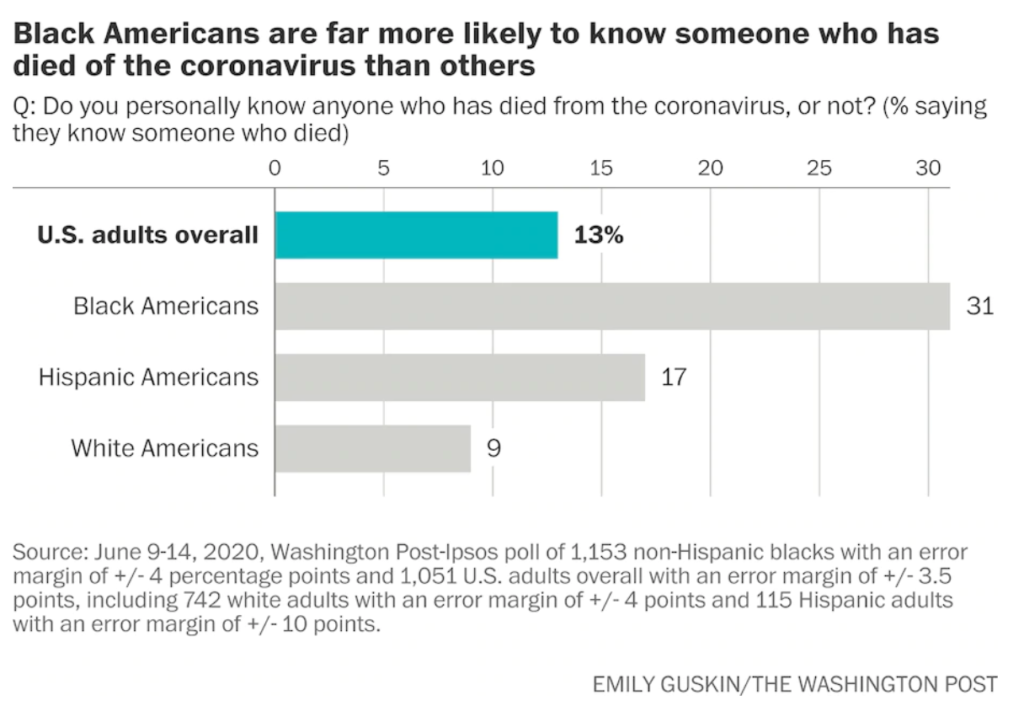
A Washington Post-Ipsos poll showed that “31 percent of Black adults say they know someone firsthand who has been killed by the virus, compared with 17 percent of adults who are Hispanic and 9 percent who are white.” Recent Centers for Medicare and Medicaid Services data demonstrated that “Black Americans enrolled in Medicare were hospitalized with the disease at rates nearly four times higher than their white counterparts.”
Despite high death rates and high unemployment due to COVID-19, a Brookings Institution survey found that African Americans are more optimistic and report better mental health than their white counterparts. The authors conclude that reasons for resilience among African American survey respondents include “a historical trajectory of overcoming adversity, strong community ties, and continued belief in the promise of education at a time that it has faded among low-income whites.”
Vox discussed the issues that may prevent successful tracing in the Black community when it comes to sharing information, including a historical distrust of the American government. The author suggested that to rebuild trust with Black communities and encourage participation in contact tracing, contact tracers must receive culturally competent training, and Congress should pass legislation to ban law enforcement and the Immigration and Customs Enforcement from accessing this data. In June, dozens of civil rights, civil society, and consumer protection organizations sent a letter to Senate leaders endorsing principles to uphold civil rights and privacy in efforts to deploy technology related to COVID-19.
Pew Research Center analyzed the perspectives of 4,708 American adults about the COVID-19 pandemic in June and found that white adults (41%) were substantially less likely than Black adults (61%) to say that masks should always be worn. Pew also found over the past two months (April compared to June), the share of all adults saying the worst is still to come fell from 73% to 59%, while the share of Black adults remained essentially unchanged (from 79% to 77%).
Organizing
The Leadership Conference and All Voting is Local held “a week of action” for their And Still I Vote campaign to mobilize voters and urge the Senate to pass the HEROES Act to ensure officials have the resources to establish fair, safe, and accessible elections. This included a collaboration with Mothers of the Movement and Black women celebrities who issued a letter to Majority Leader Mitch McConnell (R-KY) and Minority Leader Chuck Schumer (D-NY) in support of the HEROES Act.
The NAACP Legal and Educational Fund, Inc also issued a petition in support of the HEROES Act, which would fund critical COVID-19 voting rights responses and extend voter access.

The National Women’s Law Center with special guests Speaker Nancy Pelosi (D-CA), Senator Elizabeth Warren (D-MA), Representative Rosa DeLauro (D-CT), and Senator Cory Booker (D-NY) hosted a virtual rally to celebrate the importance of childcare and call on elected officials to give more resources and attention to the childcare industry.
On Monday, June 22, Louisville Urban League members and Black Voters Matter drove through West Louisville to encourage and energize voters for Kentucky’s primary election on Tuesday.
Coalition on Human Needs started a petition that calls on Congress to pass emergency rental insurance and broaden the moratorium on evictions to alleviate the cost of rent for households that lost sources of income during COVID-19.
Events
Upcoming events include “Policing, Incarceration, Homelessness, & COVID-19” (National Law Center on Homelessness and Poverty, July 1); “Responding to the Crisis: Climate and the 2020 Campaign” (Third Way, July 1); “Under the Blacklight: COVID, White Power & the Unseeing of Race Again” (African American Policy Forum, July 1); “Sounds of the Diaspora: An Evening of Conversation & Celebration of Black Immigrant Communities” (Black Futures Lab, July 2); “This Movement Moment” (Marguerite Casey Foundation, July 2); and “State of the States: Pandemic-Driven Budgeting Innovations” (Urban Institute, July 8).
Last week’s events were held by Black Communities: A Conference for Collaboration, Brookings, Congressional Progressive Caucus Center, New America, One Voice, Politico, Rainbow Push Coalition, The Boston Globe, The Leadership Conference for Civil and Human Rights, and Urban Institute.
Podcasts
“Protecting the 2020 Election from COVID19’ with Gowri Ramachandran” (WashingTECH Policy Institute)
Community Organizations
Miami Workers Center and Struggle for Miami’s Affordable Sustainable Housing (SMASH) hosted their monthly housing crash course in preparation for the expiration of the eviction moratorium on July 1 in Florida.
One Voice, MS, Journey 4 Justice, and IDEA issued a call to action and rallied in front of Governor Tate Reed’s Mansion for Education Equity during the reopening of schools for the 2020-2021 school year and beyond.

